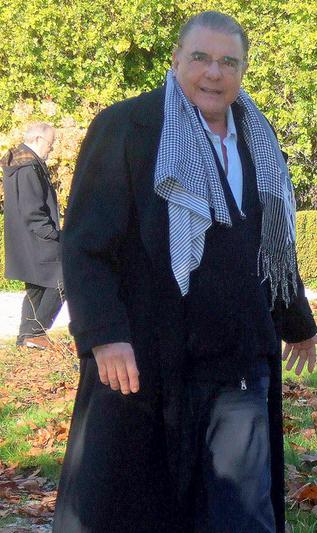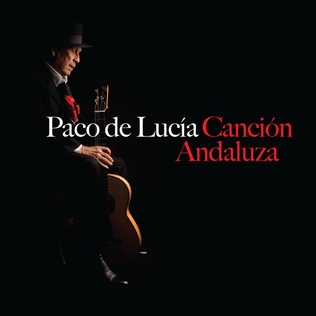
D&D Studios was a recording studio at 320 West 37th Street in the Garment District and Hudson Yards neighborhoods of Manhattan in New York City. Artists who recorded there included Jay-Z, Foxy Brown, The Notorious B.I.G., Fat Joe, Nas, Gang Starr, Jeru the Damaja, Afu-Ra, KRS-One, Frankie Cutlass, Violadores del Verso, Big L, and Black Moon.

Paso Doble is a German Neue Deutsche Welle band that formed in 1983. Their songs "Computerliebe", "Herz an Herz" and "Fantasie" have appeared on several Best of NDW/new wave compilations. They are well known for their unique sound as well as their unusual style and choreography, which have a Spanish style to go with the band's name, Paso Doble.

SFDK are a hip hop music crew from Seville, Spain.
Spain was represented at the Eurovision Song Contest 2004 with the song "Para llenarme de ti", written by Kike Santander, and performed by Ramón. The Spanish participating broadcaster, Televisión Española (TVE), selected its entry through the third series of the reality television music competition Operación Triunfo. Four artists and songs ultimately qualified to compete in the final of the competition's Eurovision selection show where a public televote exclusively selected "Para llenarme de ti" performed by Ramón as the winner, receiving 38.8% of the votes.

Hernán Enrique Jiménez Pino, is a Panamanian singer better known by his stage name Makano. At the age of 12, Jiménez was part of a reggaeton group called "Los Makanos". The members of the group made a promise that the first of them to record a full album would carry on the group's name. Makano in Panama and Colombia means "strong like a tree".

Domingo Antonio Edjang Moreno, better known by his stage name El Chojin, is a Spanish rapper and songwriter. He is the current Guinness World Record holder for most syllables rapped in one minute.
Mike Porcel is an exiled Cuban born-American musician, guitarist, composer, orchestrator and songwriter better associated with the Cuban musical movement of the 60s & 70s Nueva trova. He has been called one of the most influential and creative contemporary Cuban musician of his generation. His compositions carry a heavy dose of poetry mixed with complex guitar melodies influenced by a tremendous array of musical styles, from classical music to rock, jazz, ethnic rhythms and new age. He was also the co-founder and musical director of the Cuban progressive-rock band "Síntesis".

Juan Luis Galiardo Comes was a Spanish television, theater and film actor.

La Alta Escuela was a Spanish hip hop group formed in Sevilla, Spain. The group was composed of Tote King (mc), Juaninacka (mc) together with Juanma (MC) (mc), Dj Randy (dj) and El Tralla (mc), who the one left the group before extracting his only one LP En pie de vuelo.
This is a list of Spanish television related events in 1995.
This is a list of Spanish television related events in 2002.
This is a list of Spanish television related events in 2003.
This is a list of Spanish television related events from 2012.

Dios Ke Te Crew is a Rap music group formed in 2003 in Ordes, Galiza. Its members are DJ Murdock, Sokram, Mou and Jamas. Their songs are performed in Galician language. Later they also formed a group of graffiti and breakdance. All these aspects of hip hop come together in live performances of the group, where it is common to witness the painting of graffiti in the background of the stage and breakdance, while the band plays its songs. Their lyrics tend to be heavily political, criticizing things like capitalism, the Guardia Civil, the Spanish monarchy, the discrimination of the Galician language or corruption.

Ignacio José Fornés Olmo is a Spanish rapper, poet, writer, sociologist and actor, initially known as Nach Scratch.

Antón Álvarez Alfaro, known professionally as C. Tangana, is a Spanish rapper. He began his musical career while in high school, rapping under the pseudonym Crema and releasing a seven-track EP titled Él Es Crema (2005). He gained recognition in Spain as a member of the band Agorazein. In 2016, Tangana began performing as a solo act under the stage name C. Tangana.

Humberto Waldemar Asdrúbal Baeza Fernández, also known as Tito Fernández, El Temucano, was a Chilean singer-songwriter and folklorist. He recorded and released more than 40 albums from the 1970s to the present.
Diamante Eléctrico is a Colombian rock band formed in 2012. The band consists of Juan Galeano, Daniel Álvarez (guitar) and Andrés Kenguan. The band has released six studio albums and has received four Latin Grammy Awards, including Best Rock Album twice.

Canción Andaluza is the final studio album by Spanish musician Paco de Lucía, released on April 29, 2014 through Universal Music Spain. It was released posthumously after his death on February 25, 2014. Produced by de Lucía himself, it features collaborations with fellow Flamenco singers Estrella Morente and Vicente Castro "Parrita", and Venezuelan salsa musician Oscar D'León.












